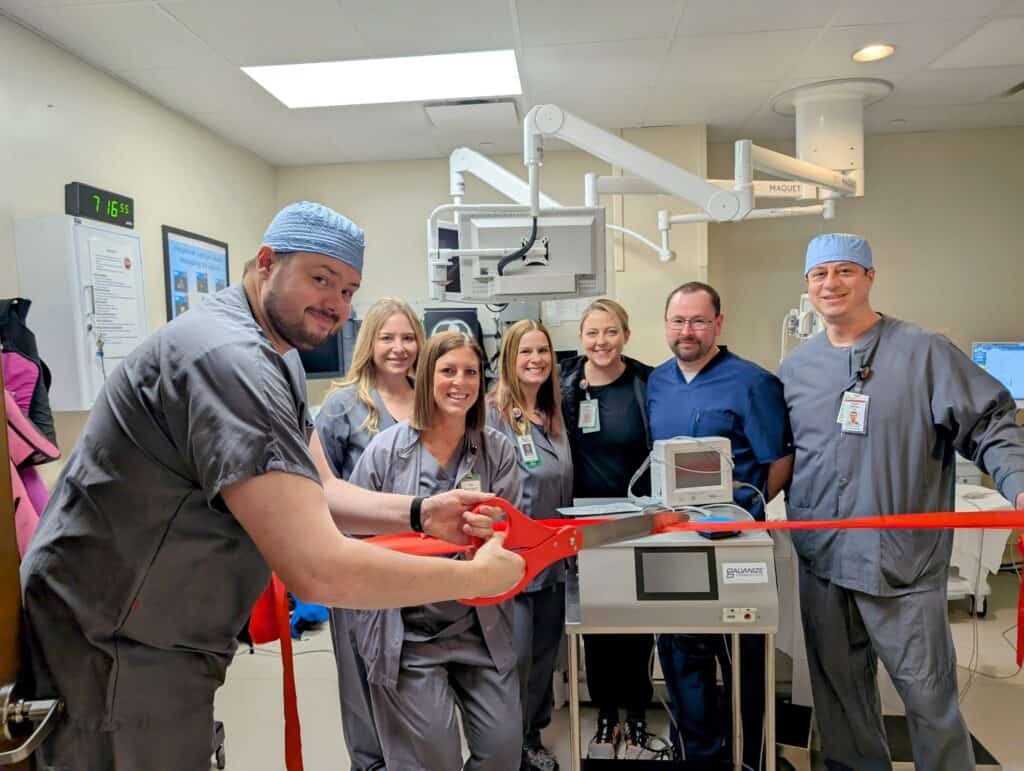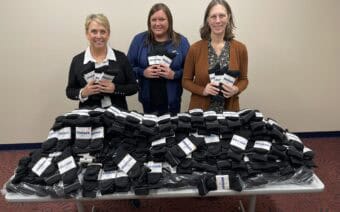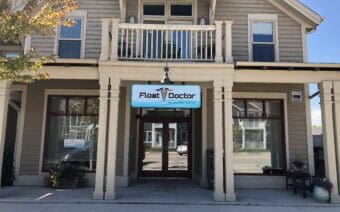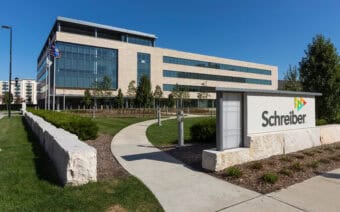
July 14, 2025
NORTHEAST WISCONSIN – This year, ThedaCare expanded treatment options for its patients battling advanced soft tissue cancer – introducing a different type of procedure performed using the all-new Aliya® Pulsed Electric Field (PEF) System.
“ThedaCare has a dedication to bringing the highest, quality-based care to their cancer patients,” Scott Parrish – a pulmonary medicine specialist with Fox Valley Pulmonary Medicine and the medical director for interventional pulmonary medicine at ThedaCare – said.
PEF, Parrish said, is a relatively new technology, and only recently was it applied to treating soft tissue cancers.
“It’s fairly new in terms of the mechanism of ablation and then using it to apply to cancer [treatment], specifically,” he said.
Crediting both the health system’s operational preparedness and his professional relationship with the people who introduced the Aliya to the market, Parrish said those contributing factors created the perfect storm that allowed ThedaCare to be the first health system in the state to perform the procedure.
“We have a large conglomeration of different specialists that are located with[in the] ThedaCare [health system] to help treat cancer,” he said. “So, anywhere from, obviously, me, [a pulmonologist], to the medical oncologist, radiation oncologist, surgeons, our radiologist – I think they have got a great team together, and I think they have a system in place that can allow this kind of technology to take off.”
Harsha Poola – an oncology and hematology specialist at ThedaCare – said the health system’s adoption of the new treatment also speaks to the promise it makes to its patients undergoing cancer treatment.
“The use of this new, minimally invasive procedure highlights ThedaCare’s dedication to being a leader in medical advancements and offering our patients and their families access to high-quality, innovative healthcare services,” he said.
Treatment targets solid tumors
Right now, Parrish said the Aliya procedure can be administered using two distinct methods.
“One – [the] way I do it – is through a bronchoscope, which is a thin tube with a camera that goes down into the airway,” he said. “We use a couple of different tools – such as robotic bronchoscopy, or something called inter bronchial ultrasound – to target the tumor, and then there’s a needle that’s put through that device [to] deliver this pulse, [or] electrical field, which destabilizes the membrane of the cancer cells. The other way that it is being done is percutaneously… with an interventional radiologist… through a needle-based technology.”
The new “image-guided technique,” Poola said, can be used for a more precise, targeted treatment of cancer cells.
“[We] insert a needle into the target area and deliver the electrical pulse,” he said. “The pulse destabilizes the target by essentially poking holes into the cancerous cells. This tactic helps keep healthy tissue intact while helping to kill the targeted cancer cells.”
Traditional treatment options currently on the market, Parrish said, use “a couple of different” methods to target cancer cells.
“One of the [ways] is [to] use a heat ablation, [while] another one [uses a] cold ablation,” he said. “This [new PEF] type of technology, basically, can be performed non-invasively, and it’s non-thermal. So, the risk of damage to surrounding healthy tissues is minimized.”
Currently, Parrish said he is the only provider trained on the procedure using the bronchoscopy approach at Fox Valley Pulmonary Medicine clinic in Appleton.
“We are talking about expanding that approach, but [that would need to] involve additional specialists,” he said.
Parrish said the procedure is currently only being used to target and treat “a variety of soft tissue cancers.”
“So, things like lung cancer, prostate cancer, metastatic ovarian cancer,” he said. “Basically, solid tumors, in comparison to blood-borne tumors like lymphoma or leukemia.”
Limited applicability
To qualify for the Aliya procedure, Parrish said patients must have already undergone standard cancer treatments.
“Right now, we’re really using it for patients who have had standard chemotherapy [or] radiation therapy, but have had evidence of recurrence or advancement of their disease despite that therapy,” he said. “There’s not a nice box to put patients into, [so] we approach this with a multidisciplinary team… and talk about these patients, where they’re at with their treatment and possible treatment options for them.”
The first ThedaCare patients to receive the new Aliya procedure were treated in April 2025, Parrish said – adding that although it is a new tool in healthcare providers’ belts, it still takes time for the treatment to effect noticeable change during a patient’s recovery journey.
“It’s not immediate,” he said, “[and], actually, the patients we’ve treated in April will be undergoing their follow-up scans imminently to see how they’ve responded to the treatment. So, you need to give it a little bit [of time before you can] see the response.”
And because the new treatment is limited to those who’ve already undergone radiation or chemotherapy, Parrish said the option allows providers to further individualize a patient’s treatment.
“It is a concerted, ongoing effort to help provide the individualized care our patients need and deserve,” he said.
In time, Parrish said he hopes the technology will become standard in caring for certain patients struggling to battle advanced soft tissue cancers.
“A long-term goal is to make the Aliya system a regular part of our cancer treatment options,” he said. “This is another tool that our team can access as a treatment option for those who have been diagnosed with cancer.”
To learn more about the treatment, visit thedacare.org.
 Firm roots in the past, with an eye on the future
Firm roots in the past, with an eye on the future Shepherd & Schaller Sporting Goods named 2024 Business of the Year
Shepherd & Schaller Sporting Goods named 2024 Business of the Year








